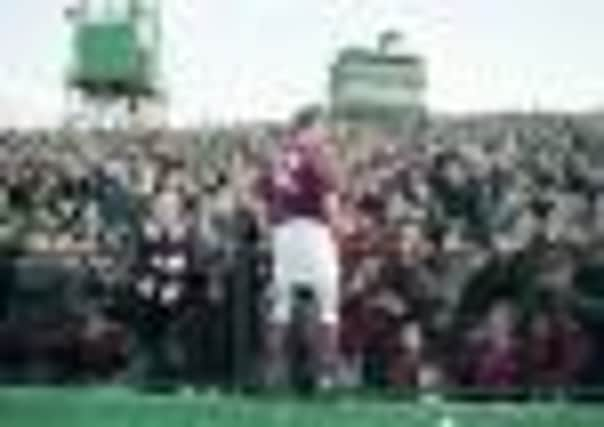Past five capital cup duels: Hibs 1 - 2 Hearts; 20 February, 1994


At Hampden on Saturday, as Hibs try to bring an end to a mere ten-game run without a victory, their supporters will tell themselves their team are overdue a win. They told themselves the same thing back in 1994 – perhaps with even more conviction, and certainly with more desperation – but their optimism was dashed when Wayne Foster scored a late winner for the visitors at Easter Road.
If there is one thing for which that game is remembered, it is Foster’s goal and the iconic celebration which followed as he jumped on to the fence at the away end of the ground to salute the jubilant Hearts support. The Englishman served the Tynecastle club well for eight years, but it is that ecstatic moment above all others which explains why, the best part of two decades on, the song of “Wayne, Wayne, super Wayne” is still heard every derby day and is sure to be given another airing in Glasgow this weekend.
Advertisement
Hide AdAdvertisement
Hide AdYet, as is invariably the case in matches with one outstanding incident, there was a lot more to the contest. John Robertson opened the scoring in the second minute to get the game off to a great start for Hearts, but it was far from one-way traffic from then until the winner came at the other end of the game.


Indeed, once Keith Wright had equalised towards half-time it was Hibs who enjoyed the upper hand for long stretches of the match. “Hibs had hammered us on the day,” Hearts midfielder Gary Mackay recalled this week.
But hammer as they might, the home team found it extremely hard to break down a Hearts defence which included Craig Levein and Alan McLaren. And when they did get the better of those two, they found goalkeeper Henry Smith in inspired mood.
“We scored first, as we usually do, then took our foot off the pedal,” Smith remembers. “That’s when I was brought into business.
“They equalised just before half-time, then for a good while in the second half had us under a bit of pressure, and I had a few saves to make. But that’s what I was paid my money for.
“Once we took the lead we tried to take the sting out of the game. But we knew they’d try to raise their game, and they did. The equaliser came when Keith Wright got on to a through ball at the back and got one on one with me.
“Even then we felt solid enough, and were confident of taking it to a replay if it had to go to that. Then Fozzie popped up, got a through ball and scored. And there were about three or four minutes to go then and they had no time to come back.”
In today’s game those three or four minutes would more likely be eight or nine, given the amount of stoppage time which referees tend to add on. Back then, only 18 seconds were played beyond the 90-minute mark.
Advertisement
Hide AdAdvertisement
Hide AdEven so, Hibs still threw everything they had left into the search for an equaliser, and in the dying minutes Michael O’Neill was not too far away from connecting with a loose ball at the near post after a free-kick had been drifted towards Smith’s goal. But Hearts held on, and the celebrations which followed the Foster goal had barely died down when the final whistle blew and they started up all over again.
“I remember two things about the goal,” Smith coninues. “First, I had turned round with my back to play, to check something in my goal or something like that, and when I turned back all I saw was Fozzie breaking clear and Jim Leighton running out towards him.
“The next thing I saw was all the Jambos at that end leaping up in the air and I knew then that Fozzie had scored. Fozzie had pace to burn. He could catch pigeons, that lad.”
With players of the calibre of John Robertson, Maurice Johnston and John Colquhoun in the squad, Hearts were a confident team who could produce goals from several sources. Indeed, the matchwinner himself was unable to find a place in Sandy Clark’s starting line-up, such was the strength of the squad up front.
And, if they were confident whenever they took the field, Hearts were especially convinced of their own ability when it came to the derby. Their unbeaten run had begun in April 1989, and would go on beyond the five-year mark, with a goalless draw at Easter Road a couple of months after the cup game turning out to be the last of the now-fabled 22 in a row.
“We knew we had the Indian sign over them going into the game,” Smith says. “You could see in the tunnel they weren’t up for it. We’d get into their heads into the tunnel, saying ‘Let’s get ten in a row’, then ‘Let’s make it 11’ and so on. And Gary Mackay shouting ‘Let’s get into them’.
“We had a very good squad then. There was Fozzie and Gary, Robbo, Chuck [Neil] Berry. . . a lot of really good players.”
Smith will be in the Hearts end at Hampden on Saturday along with members of his family, and has as much confidence in the current side as he had in his own team-mates back in the mid-1990s.
Advertisement
Hide AdAdvertisement
Hide Ad“I think they’ll do it,” he says. “Look at both squads, and ask yourself would Hearts take a single player off the Hibees?
“The better team on the day wins it, and you saw how Hearts worked their socks off in the semi-final against Celtic. As long as they do the same on Saturday I think they’ll be all right.”